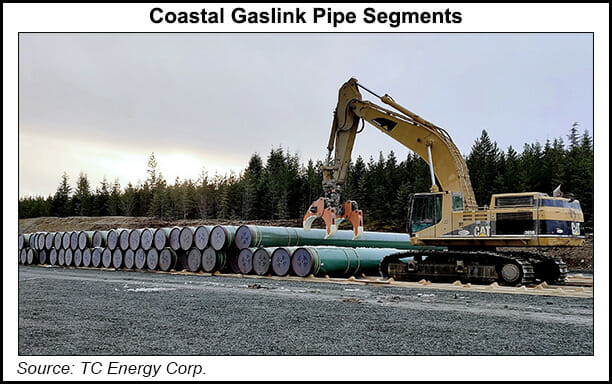Infrastructure | LNG | LNG Insight | NGI All News Access | NGI The Weekly Gas Market Report | Shale Daily
BC Regulators Order More Work to Stop on Coastal GasLink
Work has stopped on a stretch of the Coastal GasLink pipeline that would ultimately feed the LNG Canada facility under construction in British Columbia (BC) after provincial regulators discovered erosion and sediment control issues.

The BC Environmental Assessment Office’s (EAO) Compliance and Enforcement Branch issued orders last week to halt work along a 12-mile stretch of the project after site inspections revealed the issues were causing impacts to the upper Anzac River watershed about 80 miles northeast of Prince George.
Construction on the section of pipeline won’t be able to resume until a follow-up inspection confirms that remediation efforts comply with an agreement the company reached with regulators last year detailing work execution plans. The EAO said activities at the four sites in question did not adhere to last year’s framework.
The spring melt and heavy rainfall have created erosion issues in the mountainous region, where fast-changing conditions have complicated construction.
“Two weeks prior to the latest orders being issued, we halted the majority of construction in the area, so that we could enhance our erosion and sediment control measures during this challenging Spring melt season,” Coastal GasLink said in a statement.
Construction has been paused in other areas as a precautionary measure. The project has also launched a third-party review of its erosion and sediment control plans to improve effectiveness.
The project, which is 87% complete, has received dozens of warnings from regulators and paid more than $400,000 of fines for similar violations. It was ordered to stop work on another 1.8-mile stretch last month.
“We will continue to evaluate conditions and respond to water management issues if and as they arise across the project throughout the spring melt season,” the project sponsors said.
Sponsor TC Energy Corp. is still aiming to finish the 2.1 Bcf/d, 416-mile project by the end of this year. It would move natural gas from the Western Canadian Sedimentary Basin in northeastern BC to the 14 million metric tons/year LNG Canada export terminal in Kitimat, BC. The terminal is expected to enter service around 2025.
TC’s management team has said commissioning and clean-up work on Coastal GasLink would stretch into 2025.
The project has faced repeated cost overruns due to labor shortages, contractor disputes, drought conditions and erosion control issues, among other things. TC last revised its cost estimate in February from about $8 billion to nearly $11 billion.
© 2024 Natural Gas Intelligence. All rights reserved.
ISSN © 1532-1231 | ISSN © 2577-9877 | ISSN © 1532-1266 | ISSN © 2158-8023 |


